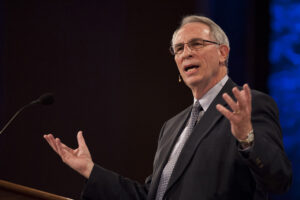
EDITOR’S NOTE: Modern hymn writer Keith Getty has written a series of essays, each focusing on a Christmas hymn or carol. This is the ninth of an 11-part series in Baptist Press.
 NASHVILLE (BP) — “Joy to the World,” one of the nation’s most popular carols, is celebrating its 300th anniversary this year. And to celebrate we’ll be doing all the verses at our Christmas concerts.
NASHVILLE (BP) — “Joy to the World,” one of the nation’s most popular carols, is celebrating its 300th anniversary this year. And to celebrate we’ll be doing all the verses at our Christmas concerts.
Written by Isaac Watts, an English minister and renowned father of English hymnody, it wasn’t originally intended to be a Christmas carol, it was meant to be sung all year ’round. Much of it is based on the Psalms, particularly Psalm 98:4, “Shout for joy to the Lord, all the earth.”
Watts was a prolific songwriter and introduced a new way of rendering the Psalms for church services as an alternative to the more Presbyterian and Reformed singing of the Psalms. He was a Free Church man who wanted to sing the Psalms in light of Christ’s return. So, for example, the second verse is based on Psalm 33:
Joy to the earth, the Savior reigns
Let men their songs employ
While fields and floods, rocks, hills and plains
Repeat the sounding joy
This carol is unusual in that the words do not simply focus on the joy we experience as we look back and celebrate the incarnation; they also encourage us to look forward, to discover the joy we can find by reflecting on our future hope, the second coming of Christ.
One of the reasons the song has become a Christmas classic is because the first verse announces the birth of Christ: “Joy to the World; the Lord is come!” What a wonderful proclamation!
And then, in the line, “let every heart prepare him room”, we hear an echo of the innkeeper who had no room for Mary when labor was near (Luke 2:7). We rightly sing this lyric to our own hearts and to others’ as an invitation to prepare room in each of us for the good news of the Savior’s birth.
The third verse is perhaps unfamiliar to many of us, maybe for good reason as the imagery of ‘the curse’ doesn’t fit well with our Christmas festivities.
No more let sins and sorrows grow
Nor thorns infest the ground
He comes to make His blessings flow
Far as the curse is found
Far as the curse is found
Far as, far as the curse is found
But without the presence of the curse (Genesis 3:16-19), the promise of deliverance loses its power (Genesis.3:15). These lines point us to the day when God’s blessing (Genesis.3:17) flows as ‘far as the curse is found.’
In the final triumphant verse, we are reminded that while the sting of sin is great, there is a hope that is greater: Jesus Christ who rules the world with truth and grace. It is this grace that causes hearts dead in sin to come alive in Christ (Ephesians 2:89). The final two lines of our hymn call us to continue marveling in “The glories of his righteousness, And wonders of his love.”
No Christmas concert or Christmas eve service would be complete without it. It is an undeniably joy-filled declaration of God’s goodness.
About Keith & Kristyn Getty
Keith and Kristyn Getty are modern hymn writers whose compositions are sung the world over. For more information on Getty Music and the Sing! initiative, visit www.gettymusic.com.















